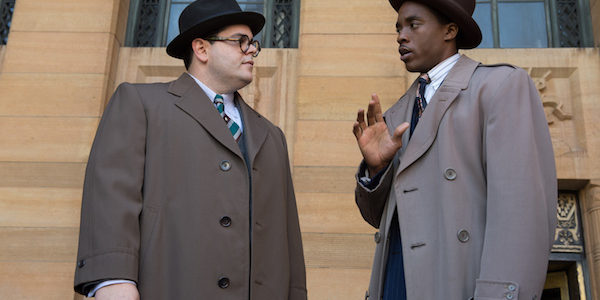
ReelBob: ‘Marshall’ ★★★½
By Bob Bloom
If not for Chadwick Boseman, “Marshall” would be your typical early-years-of-a-great-person biopic.
Wisely, though, Boseman, who seems to have cornered the market on portraying iconic black figures — Jackie Robinson, James Brown and now civil-rights pioneer and Supreme Court Justice Thurgood Marshall — does not paint a saintly picture of his subject.
Boseman’s Marshall has a brilliant and strategic legal mind — and he knows it. His Marshall also is cocky, arrogant, pushy and fierce.
Boseman makes Marshall a dynamic figure, a legal steamroller who is defiantly passionate and dedicated.
At this point in his young career, Thurgood Marshall is the only lawyer working for the NAACP — the National Association for the Advancement of Colored People.
The NAACP sends him around the country to represent in court black people who it believes are innocent of their crimes and have been railroaded because of their race.
His latest assignment takes him in 1940 to Bridgeport, Connecticut., where a black man is accused of raping a white woman. Newspapers in that state, as well as in New York, have inflamed the situation, so Marshall has his work cut out for him.
He is teamed with a local attorney, Sam Friedman (Josh Gad), an insurance lawyer who has never handled a criminal case.
The reluctant Friedman wants nothing to do with the assignment — foisted on him by his brother — fearing it would hurt his practice and standing in Bridgeport.
But Marshall does not give him a choice. He basically bullies Friedman into helping him.
When the trial judge, a stern James Cromwell, refuses to allow Marshall to participate in the trial because he is an out-of-state lawyer, Friedman is forced to handle the defense.
The best parts of “Marshall” focus on the give-and-take as Marshall continually browbeats Friedman into finding his social activism and conscience.
Honestly, at times, you want to smack Marshall for his insensitive treatment of Friedman. Yet, it is not done out of maliciousness, but because Marshall sees something in his contemporary that Friedman does not see in himself.
Gad is excellent at displaying the frustration, fear and anger within Friedman that his association with Marshall creates.
Marshall is simply trying to light a fire under his co-counsel.
Sterling K. Brown gives a complex performance as Joseph Spell, the black chauffeur accused of raping his white employer, played by Kate Hudson.
Spell is a man with a dark past who owns up to his past mistakes and insists he did not attack Hudson’s Eleanor Strubing.
Reginald Hudlin directs “Marshall,” and while the trial is the movie’s centerpiece, thematically, it also serves as a backdrop that shows segregation, prejudice and racism — in all its ugly incarnations — is not confined to the South.
Friedman, who is Jewish, is not wholly accepted by the Bridgeport gentry, who give him grief for defending a black man and working with a black attorney.
As an aside, enjoy the small performance by Ahna O’Reilly (“The Help,” “Forgetting Sarah Marshall”) as Mrs. Richmond, one of the jurors. She is priceless.
The outcome of the trial is inevitable, and the film contains the usual written prologue reciting the futures of its main characters — a tired device used in so many biopics that I have lost count.
The performers — most notably Boseman and Gad — elevate “Marshall” and make it a movie worth seeing.
I am a member of the Indiana Film Journalists Association. My reviews appear at ReelBob (reelbob.com) and Rottentomatoes (www.rottentomatoes.com). I also review Blu-rays and DVDs. I can be reached by email at bobbloomjc@gmail.com or on Twitter @ReelBobBloom. Links to my reviews can be found on Facebook, Twitter, Google+ and LinkedIn.
MARSHALL
3½ stars out of 4
(PG-13), adult themes, sexuality, violence, language